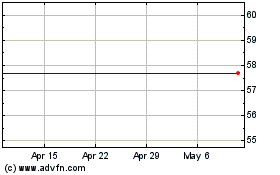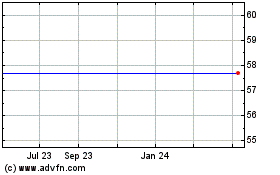Baker Hughes Outlines Cost Cuts as Halliburton Deal Dies
May 02 2016 - 2:30PM
Dow Jones News
Baker Hughes Inc. said Monday that it is working to emerge from
its failed merger with Halliburton Co. as a leaner, more focused
oil-field services company, outlining plans to cut $500 million in
costs while buying back $1.5 billion of shares and $1 billion of
debt.
A day after announcing that its merger with Halliburton, once
valued at nearly $35 billion, was being called off after regulators
claimed it would hurt competition, Baker Hughes said it would use a
$3.5 billion breakup fee it got from Halliburton to repair its
balance sheet and restructure its business.
Baker Hughes has been tethered to Halliburton since the deal to
combine the second- and third-largest oil-field services businesses
after Schlumberger Ltd. was announced in November of 2014. That has
kept it from cutting costs and making other changes in response to
an oil price rout that reduced demand for work drilling wells and
pumping oil and natural gas.
Now that it is on its own, Baker Hughes says it will focus on
its strengths and simplify its business.
"Innovation is what we do best and what our customers need the
most. It is an enviable capability that is part of our culture and
continues to differentiate us in the market," Chief Executive
Martin Craighead said in a statement.
The companies had been working for roughly a year and a half to
get the complex deal completed, and had been planning potentially
to sell billions in assets to appease regulators.
But the Justice Department sued to block the merger last month,
arguing that the deal would eliminate head-to-head competition in
markets for nearly two dozen products and services used for U.S.
oil exploration and production.
"We heard extreme statements of concern from dozens of companies
and over 100 individuals," said David Gelfand, deputy assistant
attorney general, during a conference call with reporters Monday
following the collapse of the merger.
"I think it was not fixable at all," he added. "We gave them
every opportunity to come in and convince us we were wrong about
that, but that's where we ended up at the end of the day."
European Union antitrust authorities, which had opened a full
investigation into the proposed merger in January, also said Monday
that the deal had raised competition concerns in "a very large
number of markets related to oil-field services," and said that
several customers had raised issues with the merger.
Halliburton Chief Executive David Lesar said on Sunday that the
company still believed the merger would have benefited customers
and shareholders of both companies. But in the face of regulatory
challenges and "general industry conditions that severely damaged
deal economics," calling it off was the best course.
Shares of Baker Hughes fell 3.8% Monday in New York trading to
$46.52. Halliburton shares rose 2.4% to $42.31.
Citing its cash war chest, many oil-field services experts have
suggested that Baker Hughes will be in a strong position to take
advantage of crude oil prices that have started to tick back up
toward $50 a barrel. But the company also is grappling with a
depleted workforce and it could take time for it to find
footing.
Baker Hughes had struggled in some areas even before oil prices
plunged, and is now re-entering the market at an even more
difficult moment, with too many players and not enough work to go
around, said Bill Herbert, an analyst with Piper Jaffray Cos.
"This is a much tougher market," he said. "We've got too much of
everything."
On Monday, Baker Hughes said it was "taking immediate steps" to
remove costs it couldn't previously eliminate due to merger, and
was also "evaluating broader structural changes" to further reduce
expenses and improve efficiency.
The company said it was assessing where it will provide its
current full-service model and intends to provide tailored services
to select countries as a way of bringing products to market with
lower investment and fewer risks.
One business where Baker Hughes has struggled is fracking, which
involves injecting water and other materials into a well to break
apart rock formations to release oil and gas. Analysts have said
the company stumbled as it tried to integrate BJ Services, a
fracking firm it acquired in 2010, and has struggled to master the
logistics of delivering massive quantities of sand, water, and
manpower to well sites around the country.
Baker Hughes said Monday that it would "retain a selective
footprint" in the U.S. onshore pressure pumping business as it
cited overcapacity, commoditized pricing and low barriers to entry.
Both Halliburton and Baker Hughes have significant market share in
the business. Baker Hughes also said it intends to refinance its
$2.5 billion credit facility, which expires in September.
Analysts said the collapse of the merger could spark a new round
of deal making and reshuffling among oil-field services companies,
which are grappling with the deep cuts being made by exploration
and production companies.
"There's clearly an appetite for acquisitions right now," said
Richard Spears, vice president of the oil field consulting firm
Spears & Associates.
Write to Alison Sider at alison.sider@wsj.com and Austen Hufford
at austen.hufford@wsj.com
(END) Dow Jones Newswires
May 02, 2016 14:15 ET (18:15 GMT)
Copyright (c) 2016 Dow Jones & Company, Inc.
Baker Hughes (NYSE:BHI)
Historical Stock Chart
From Aug 2024 to Sep 2024

Baker Hughes (NYSE:BHI)
Historical Stock Chart
From Sep 2023 to Sep 2024
